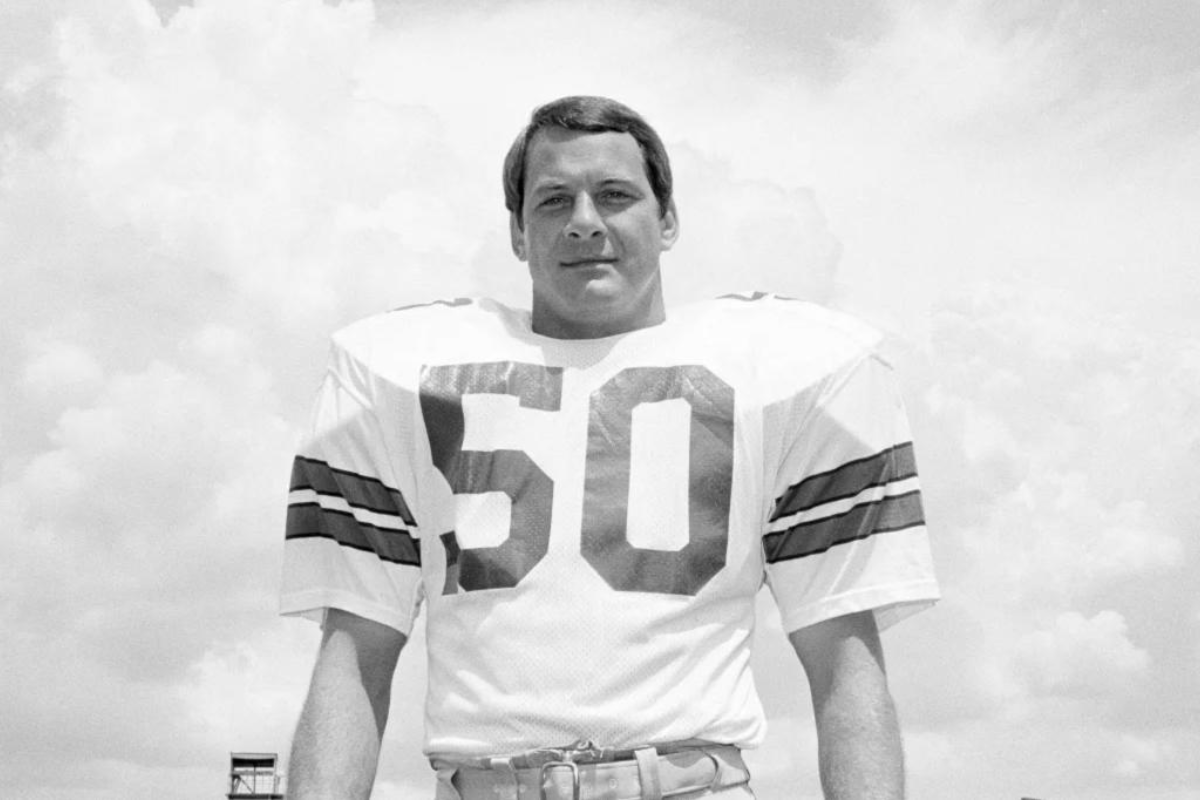
Imago
Credits: X.com/@nypostsports

Imago
Credits: X.com/@nypostsports
Dwight Douglas Lewis was born in Knoxville, Tennessee, the youngest of 14 children in a tough household. Named after WWII generals Dwight Eisenhower and Douglas MacArthur, Lewis grew up in a loud, rough neighborhood, often feeling like an underdog.
Watch What’s Trending Now!
“My house was rough, rowdy, and raucous,” he recalled during his speech to the Fayetteville, Tennessee Rotary Club.
ADVERTISEMENT
His early years were marked by struggle. He was once arrested at 13 for stealing a car. That moment was a turning point.
On his knees, scared and alone, Lewis prayed a foxhole prayer: “God, if you get me out of this, I’ll never do it again.”
ADVERTISEMENT
Then came a defining moment in DD’s life. He thought he was going to drop out of school; instead, he “found a home” for his aggression. Football became his lifeline.
ADVERTISEMENT
At Fulton High School, he was a standout linebacker, earning all-state honors in 1963. Mississippi State came calling, where Lewis blossomed as a two-way starter from 1965 to 1967.
He earned All-SEC honors twice and was named SEC Defensive Player of the Year as a senior.
ADVERTISEMENT
Legendary Alabama coach Bear Bryant called him “the best linebacker in the country.”
Lewis passed away on September 16, 2025, at the age of 79. Despite the college accolades, the Dallas Cowboys drafted D.D. late in the sixth round in 1968 because teams thought he was too small.
ADVERTISEMENT
He spent 1969 serving in the Tennessee National Guard, then returned in 1970 to the Cowboys training camp. At first, he played mostly special teams, learning Tom Landry‘s complex flex defense.
Landry, recognizing Lewis’s grit, called him the “most underrated player” on the Cowboys.
Former Cowboys LB D. D. Lewis has died at 79. He won two Super Bowls and played in the most playoff games in Cowboys history.
Lewis is also well-known for his quote about Texas Stadium, the Cowboys’ former home.
Read more about Lewis from @calvinwatkins: https://t.co/AmEss2VONI pic.twitter.com/nuri4fmCtj
— SportsDay Cowboys (@dmn_cowboys) September 17, 2025
ADVERTISEMENT
Lewis took over as the starting weakside linebacker in 1973. Over nine years, he became a key piece of the Doomsday Defense, a unit that dominated the NFL in the ’70s.
Lewis played in 27 playoff games, a Cowboys record that still stands, while appearing in five Super Bowls and winning two championships.
At the time of his retirement, that playoff tally was a league-high, since topped by only four men (Tom Brady, Adam Vinatieri, Stephen Gostkowski, and Jerry Rice) and tied by Peyton Manning.
ADVERTISEMENT
His finest postseason showing came in the 1975 NFC title game, when he picked off two passes in a 37-7 rout of the Rams.
His final game brought bittersweet memories. The 1981 NFC Championship ended in heartbreak with “The Catch,” when Joe Montana’s touchdown pass to Dwight Clark ended Dallas’ Super Bowl hopes.
Lewis remembered tracing Montana on that famous play, his last on the field.
ADVERTISEMENT
“In that game, you may have seen it – where Montana rolls out to his right and he throws the ball to Dwight Clark in the end zone,” DD said in the Rotary Club speech. “Now, if you ever see that play again, look for a number 50. Slow motion, I am tracing Montana, that was my last play. I was getting out of the shower not long ago. And I’m thinking, why didn’t you blitz on that place? How many of us have something in our past that we just can’t get rid of?”
Despite his remarkable career and lasting impact on the Cowboys’ success, D.D. Lewis never received induction into the Pro Football Hall of Fame.
He started 135 consecutive games and was a key fixture in the legendary Doomsday Defense. And fans voted him the Cowboys’ most popular player in his final season.
But life after football was tough for Lewis.
D.D. Lewis’ legacy beyond the spotlight
Off the field, Lewis faced battles too. He candidly admitted to living “a double life,” balancing faith with past struggles with addiction.
Thankfully, by the late ’80s, he found sobriety and a new purpose. Lewis the grinder carried that same resilience into his battles off the field — for himself, his family, and his faith.
Teammates remember him as a true locker room leader. Thomas “Hollywood” Henderson said,
“D.D. was a great player. He kept Thomas Henderson from the weak side because he played it so well. D.D. was a tough guy, and I wanted his job Day 1, but I never could get it because he played [coach Tom] Landry’s defense, and I couldn’t interrupt that. So I ended up on the strong side, which was better for me because I got to box every down.”
Mississippi State praised his lasting legacy:
“We mourn the passing of Bulldog legend D.D. Lewis,” they wrote. “An All-SEC standout and 1967 SEC Defensive Player of the Year, he played 13 years with the Dallas Cowboys, appeared in five Super Bowls, won two, and was inducted into the College Football Hall of Fame in 2001.”
Lewis’s legacy also endures through his iconic quote about Texas Stadium: “It has a hole in its roof so God can watch His favorite team play.”
D.D. Lewis was the unsung hero who built a dynasty with sweat, grit, and loyalty. His life, from those rough Knoxville streets to the pinnacle of football greatness, is a blueprint for resilience and humility. He wasn’t just a Cowboy. He was the heartbeat of the Doomsday Defense.
ADVERTISEMENT
ADVERTISEMENT
ADVERTISEMENT
.png)
.png)
.png)



